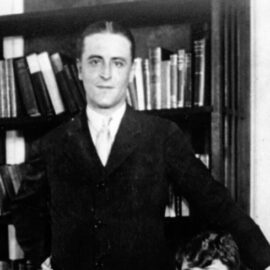

This article is an excerpt from the Shortform book guide to "The Richest Man in Babylon" by George S. Clason. Shortform has the world's best summaries and analyses of books you should be reading.
Like this article? Sign up for a free trial here .
Who is Arkad from The Richest Man in Babylon? What is his role in the story? How did Arkad go from a poor scribe to a wealthy merchant?
Arkad is a fictional character from George S. Clason’s 1926 compilation of pamphlets titled The Richest Man in Babylon. He is the medium through which Clason imparts his advice on acquiring wealth. In the book, Arkad, who started his wealth journey as a poor scribe and ended up becoming a successful merchant, teaches the secrets of wealth to locals who come to him to learn how to stop struggling financially and become rich.
Here goes the story of Arkad, the richest man in Babylon.
The Setting for Arkad’s Story
The story of Arkad, the richest man in Babylon, takes place in Babylon, one of ancient history’s greatest and wealthiest cities. It was built not on natural assets but by work and ingenuity.
It was founded in 2300 BC in Mesopotamia, beside the Euphrates River in a dry valley about 60 miles south of Baghdad in present-day Iraq. The area had little rainfall and lacked building materials such as stone and forests for wood.
The city exemplified humans’ ability to make the most of what was at hand—the only available resources were good soil and water from the river, and Babylonians took advantage of them. Engineers channeled water from the river to grow crops by creating irrigation canals and huge dams. Besides creating the irrigation system, they drained swampland at the mouths of the Euphrates and Tigris rivers for additional cultivation.
The city was built of brick made locally and was surrounded by walls and a moat, with a royal palace and a magnificent gate. It may have contained the fabled hanging gardens of Hammurabi and an immense tower to the gods. Besides having some of the earliest engineers, Babylon had mathematicians, astronomers, artists, and financiers—the latter reportedly invented money by using gold as a means of exchange. The city is described in admiring terms by Greek historian Herodotus and others.
Babylon was captured multiple times and ruled by a succession of kings, including the biblical king Nebuchadnezzar. The city fell to Persian ruler Cyrus the Great in 539 BCE.
(Shortform note: Babylon’s ruins were discovered and excavated by a German archeological team in 1899-1917. Clay tablets with cuneiform inscriptions were found describing life at the time, including property titles, sales records, and promissory notes.
In the 1980s, Iraqi dictator Saddam Hussein built a $5 million replica of Babylon’s royal palace on top of the historic ruins, to the dismay of archeologists. On some of the bricks, he inscribed: “Built by Saddam, son of Nebuchadnezzar, to glorify Iraq.” The ruins suffered further damage in the U.S.-Iraq war.)
Although the ancient city is gone, the financial wisdom that took root there remains useful:
- We measure success by money.
- Those who understand the laws for acquiring money and growing it become rich.
- The same laws that governed money in ancient Babylon govern it today.
Arkad: The Richest Man in Babylon
Two friends, Bansir and Kobbi, a chariot builder and a musician, get tired of working hard to get by without ever improving their status. So, they gather some additional friends and approach Arkad for advice on how to become wealthy. Arkad, who began his working life as a poor scribe, obliges by recommending “Seven Cures for a Lean Purse.”
1) Pay Yourself First
Save 10 percent of everything you earn, even if you’re in debt, to start building wealth. You’ll find that you get along just fine on 90% of what you earn and in ten years, you’ll have saved a year’s earnings. To visualize this, think of collecting ten eggs every day. Each evening, take nine from the basket to sell and keep one for yourself. Eventually, your basket will overflow because you’re putting in more eggs than you’re taking out.
Only the money you consciously set aside is truly yours. You may think all of your earnings belong to you, but when you don’t save a portion, you give them to everyone but yourself. For instance, they go to your grocer, your landlord, your shoemaker, etc.
Although you’ll be tempted to spend your savings at times, remember that spending brings only temporary gratification, while saving builds long-term wealth and security. And the person who saves part of his earnings will find it easier to acquire more money.
2) Control Your Spending
After you save a tenth of your earnings, determine your necessities and create a budget to cover them, plus a few worthwhile things you enjoy, not exceeding the remaining nine-tenths of your income. Don’t confuse wants with needs. If a pack animal got to choose his burden for a long trip, he’d choose to carry grain, hay and water—necessities—rather than gold and jewels.
Live within your means or, better yet, live below your means. Should your earnings increase, beware of lifestyle inflation, which is the tendency to increase your spending as your income increases. What you define as necessary will always expand to keep pace with your income unless you resist.
Remember that the purpose of a budget is to grow your wealth while ensuring that you have the necessities and a few things you enjoy—without exceeding nine-tenths of your income. A budget shows you the potential “leaks” in your wallet, so you can stop them by maintaining control of your spending.
3) Put Your Money to Work
The money you accumulate from your earnings is just a starting point. You need to put it to work in ways that earn more money by investing it or multiplying it by taking advantage of compounding interest over time. (Shortform note: Here’s how compounding works: when you invest or loan out your money, you receive interest on your deposit. The next year, you earn interest on both the original deposit and on the interest you earned on it in the first year. Each year, your money multiplies as you earn interest on your interest.)
Just be sure you invest wisely, with people of honor and experience. When he was starting out, Arkad made a good investment. He loaned money to Aggar, a shield maker, whom he knew to be a man who knew his business and paid his debts. The loan enabled Aggar to order a large supply of bronze at a good price. When Aggar successfully sold all the shields he had made with the bronze, Arkad got back the loaned money plus interest. As Arkad’s capital increased, he made more loans and investments, thereby continually increasing his wealth.
By investing your money, you create a continuing income stream—your money is working for you whether you are working, traveling, or retired.
4) Protect Your Principal from Loss
The first thing to do with money you’ve saved is to protect it. Invest it only where your principal is safe and you can get it back if you want to and where you’ll get a fair interest rate.
There are many ways to lose money you’ve saved:
- You might spend it on wants rather than needs.
- Family and friends will ask for loans and may not repay them.
- You might be tempted into making an investment that you haven’t researched and that fails to pay off.
- You might be attracted by a bogus get-rich-quick scheme.
For example, Arkad made a poor investment by loaning money to a brickmaker named Azur, who was traveling and planned to buy jewels while he was away and resell them at a profit when he got home. He would split the proceeds with Arkad. However, the jewels he bought turned out to be fakes, and Arkad lost the money he’d invested to buy them.
The lesson he learned is to invest only if the person you’re partnering with is experienced in that type of investment. Don’t trust a brickmaker to buy jewels. Or, invest only with people who are experts in investing money for profit.
(Shortform note: Many people in finance today believe that investments with risk (like stocks) make sense as part of a balanced investment portfolio that includes both safer and higher-risk investments. Assuming a certain level of risk is necessary to make money, but it should be a calculated risk.)
5) Own Your Home
Make your home a profitable investment. By investing your money into buying a home and paying it off over time, you’re turning an expense into an asset. Once you own it, you’ll reduce your cost of living and you can sell it at a profit if you choose.
(Shortform note: In 1926 when this book was published, home ownership was seen as fostering strong families, promoting “moral rectitude” and civic virtue, and contributing to the well-being of the nation. “Own your own home,” a magazine article urged, “and protect it with your life and you will be a good citizen and patriot.” Another writer said he couldn’t imagine a nation being great “if all its people are renters.”
Today, the value of home ownership is debatable. Clason contends that it’s smarter to make payments that will eventually become equity than to pay a landlord. But depending on factors such as home prices, interest rates, appreciation, and your income/job stability, it may not make sense for you. In an economic downtown like that of 2008, you could end up under water—owing more on your home than it is worth.)
6) Plan for Retirement
Invest for the future for two reasons: 1) if you die prematurely, your family will be provided for and 2) when you’re no longer able to work, you’ll have an income.
Ways to do this include:
- Buying real estate and land that will increase in value and can be sold later, or make other investments.
- Making small regular deposits with a money lender (bank) over time so you keep getting more interest as it grows.
- Buying insurance.
(Shortform note: Further ways to provide for your future today include investment in stocks and bonds, and pensions/social security.)
7) Increase Your Earning Ability
Increasing your income doesn’t mean asking for a raise. That makes you dependent on a boss. Instead, take control by investing in yourself. Improve your skills or learn new skills through classes and training. The more you know, the more valuable you are and the more you might make.
Also, set goals and work to improve your performance—people who do more and better quality work get paid more. Arkad learned this by noticing that scribes who produced more work received more pay. With practice and effort, he increased his speed and received more money himself.
When you manage your finances well, you demonstrate self-respect. This includes:
- Paying your debts promptly.
- Taking care of your family.
- Making a will.
- Helping others where feasible.
- Learning as much as you can.
How Arkad Put His Principles to Work
Arkad was the son of a humble merchant. He didn’t inherit wealth or have a sudden streak of luck. Determined to discover the secrets of financial success, he started out working as a scribe in the hall of records, recording information on clay tablets. He made barely enough to cover food, clothing, and shelter.
Arkad was constantly looking for ways to get ahead, so when a money lender, Algamish, promised him extra money to complete a big transcription assignment in two days, he agreed to do it. But the job was too big and Arkad didn’t meet the deadline. Instead, he made a deal with the money lender: in exchange for instruction from Algamish in how to get rich, Arkad said he’d work all night to complete the unfinished job.
Arkad finished the work overnight and asked the money lender for the secret to accumulating wealth. Algamish’s secret was simple: he decided to keep part of everything he earned for himself. He realized that if all of his money kept going to pay bills, he’d never have any for himself and therefore would never get ahead. However, if he set aside a tenth of his earnings, it could earn him more money through interest, which would compound.
Wealth is like a tree—the more regularly you water and nourish it, the more it will grow and provide shade (security) for you.
Arkad began saving and, to his surprise, didn’t miss not having a tenth less available for spending. He resisted temptations to spend his savings on luxuries. At first, he spent the interest he earned on his savings—however, Algamish further advised him to put his money to work by earning more interest on his interest. He also looked for ways to invest. Except for the mistake of investing in the jewels that turned out to be fake, he increased his wealth gradually through wise investments.
He had learned to:
- Pay himself
- Live below his means
- Put his money to work
- Get competent financial advice
When Algamish saw that Arkad had learned to handle money wisely, he put Arkad in charge of managing his land and other wealth. Arkad increased their value and inherited a share of the estate when Algamish died. Thus, he became “the richest man in Babylon.”
Arkad’s Advice: Make Your Own Luck
Nearly everyone dreams of getting lucky—receiving a large amount of money without working for it. Some people hope for luck in gambling. The ancient Babylonians believed luck was bestowed by the gods as they chose.
However, Arkad pointed out to his students that no successful person ever credits a windfall from gambling as the start of his success—he credits effort, persistence, and smart decisions. Instead of hoping for luck, look for opportunity. The key is to recognize and seize a good opportunity for increasing your wealth when it presents itself. You make your own luck when you seize good opportunities.
The human tendency to procrastinate is your enemy. People are more likely to waffle or delay an investment when they’re right than when they’re wrong. One way to counter your tendency to waffle is to make a deposit right away. When you’re convinced an investment is smart, don’t hesitate to make it. Action, not luck, will lead you to success.
Arkad addressed several other excuses from his audience for not making the effort to acquire and grow wealth:
- It takes an unusual amount of willpower to save. Arkad’s response: willpower is nothing more than following through on what you set out to do, whether the task is large or small. When you have a habit of following through on task, you do the important things and also avoid taking on impractical things that will waste your time.
- If everyone follows the principles, there won’t be enough wealth to go around. Arkad’s response: wealth spreads outward like ripples in a pond. For instance, when you invest in building a house, those who provide the bricks and do the construction also benefit because you give them work.
- It’s too late to start now. Arkad’s response: it’s never too late to start paying yourself. Everything you save begins growing (paying interest) immediately.

———End of Preview———
Like what you just read? Read the rest of the world's best book summary and analysis of George S. Clason's "The Richest Man in Babylon" at Shortform .
Here's what you'll find in our full The Richest Man in Babylon summary :
- A compilation of financial advice pamphlets distributed by banks and insurance companies in the 1920s
- Timeless principles for managing your money
- An entertaining story written in the form of three parables







i have the hard copy of this book “the richest man in babylon” and comparing what have read to what you’ve summarized, i admittes you’ve done a good job